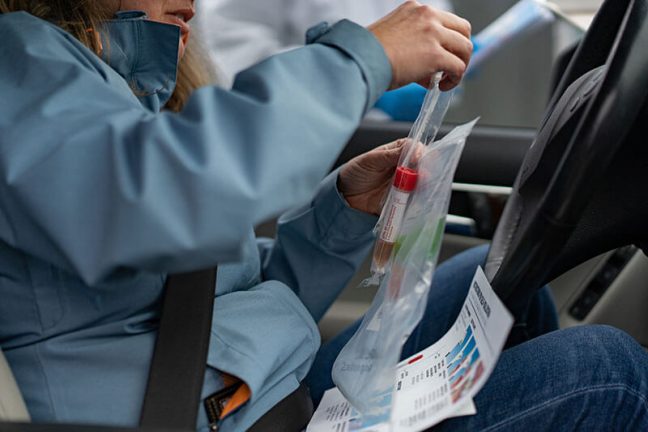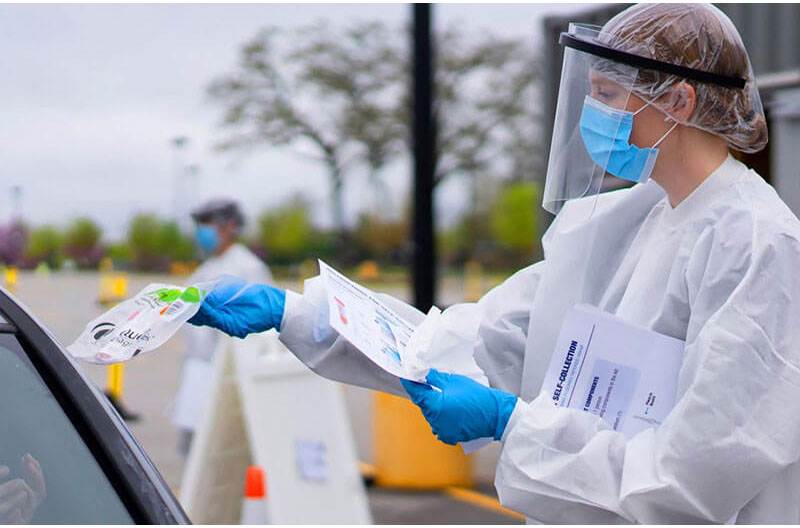Since a mid-March request from the White House, Bentonville, Arkansas-based Walmart has been working with the U.S. Department of Health and Human Services (HHS) and other partners to help with testing during the Covid-19 pandemic.
“Since the start of the pandemic, one thing has been clear: Testing would be critical. So, when we got the call to help, the question wasn’t ‘if’—but ‘how.’ We knew we could make a difference,” said EVP of Corporate Affairs Dan Bartlett.
Walmart’s team got together and worked on a plan to set up a testing site in company parking lots.
“Over the next week, our operations were refined and improved. We could move cars through faster and, when the CDC expanded testing criteria to ultimately include anyone who was experiencing symptoms and any health care provider or first responder irrespective of whether they have symptoms, we were able to help even more members of the community,” Bartlett said. “It was not without its challenges, including limits on personal protective equipment (PPE), which inhibited our ability to scale faster, but we worked through the issues as quickly as possible.
The company used two main principles in this new endeavor: making sure everyone on site is safe and providing a quality test. They began in the Chicagoland area. In early April, along with lab partners Quest and eTrueNorth, Walmart began phase two of its testing process. This allows individuals to register online and significantly reduces the wait time. The test itself also has changed from a pharmacist-assisted nasal swab to a self-administered nasal swab, observed by Walmart’s trained pharmacists.
There still is no cost for the tests, with HHS and insurance covering the cost, Bartlett said.
“We also remained resolute on our position that everyone entering the site should be treated with care,” he said.
Walmart has worked with its lab partners, local and state officials, in addition to HHS. Each site is supported by Walmart pharmacists as paid volunteers; staff from the lab partners; security/law enforcement from the local community or state, including the National Guard; and volunteers from Remote Area Medical.
In an effort to bring more testing to underserved areas, this week Walmart is adding mobile testing sites with units in Georgia, Alabama and Kansas. The mobile units will rotate between three to four different locations over the course of a week.
“It’s been 45 days and counting since Walmart got the call to stand up testing sites, and we are now supporting 20 sites in 12 states—opening more every day. As a result, nearly 13,000 people have been tested at one of our sites to date,” Bartlett said. “We have learned an incredible amount from these tests, and lab and testing capacity is increasing all the time, giving us confidence we can rapidly scale. Just this week, we will open approximately 25 more sites, and by the end of May we anticipate operating more than 100 sites, assuming there is adequate lab capacity. With 100 sites we can bring 20,000 tests a week to people who need them, especially in hot spots and underserved areas.”
Continuing to innovate
Bartlett said as new tests emerge and as testing capacity becomes more readily available with more testing kits secured, Walmart can utilize its pharmacies across the country to distribute and collect tests at much greater volume.
“Imagine going online, scheduling a test through our lab partners, pulling up to your local Walmart at your scheduled time, parking in your assigned spot and having our pharmacist greet you. You take a nasal or saliva test while you remain in the car, and the test is sent to the lab for processing,” Bartlett said. “For serology tests, perhaps you could even have your finger stuck by a pharmacist, similar to a test for blood glucose and cholesterol levels, to understand whether you have antibodies to the virus.”
He said if this scenario becomes a reality, it would allow Walmart to “be nimble, introduce new tests as there are advances and, over time, ramp up to even greater numbers.”
Walmart’s involvement in this effort is entirely donated, from parking lot space to site supplies and materials to associates’ paid time.
“We are supporting this effort because we all believe it is the right thing to do,” Bartlett said. “Hundreds of men and women at Walmart have stepped largely or completely away from their day jobs. An effort of this magnitude requires many hands—and we have teams of people in operations, health and wellness, public affairs and beyond to make these sites a reality. I am especially grateful to the Walmart pharmacists who volunteered to staff these sites. While we take every safety precaution to protect them, the work inherently puts them at increased risk, like many other health care professionals. Despite that risk, when it was first announced we would begin standing up these testing sites, within 48 hours more than 700 Walmart pharmacists and health and wellness associates volunteered to help. It’s just another example of how special our associates really are.”
Supplying PPE
Walmart also has supported efforts to get personal protective equipment (PPE) and supplies to healthcare providers on the front line. Bartlett said the company has tapped into its supply chain and apparel expertise to help McKesson source and deliver more than 2.5 million gowns and coveralls by the end of April. Walmart is planning to help add another six million gowns into the supply chain in May, with millions more in June and beyond.
“We’re doing this important work in collaboration with McKesson, who has the ability to distribute these critical products to health care professionals across the United States. We also partnered with Salesforce and State Farm to provide one million masks, 100,000 gloves and 100,000 shoe coverings to healthcare workers in Michigan and Louisiana. In New York City, we donated approximately 50,000 masks to hospitals in need. And in California, when our stores found masks in their storage rooms left from last year’s wildfires, they worked quickly to donate approximately 3,600 masks to medical centers that serve underserved communities in Los Angeles County,” Bartlett said.
With predictions that the challenges from COVID-19 will continue over the coming months, Walmart will continue to monitor developments in technology, such as new tests, to determine it continuing role in the battle against the coronavirus.
“I am inspired by the spirit and drive of my colleagues who are working hard to help meet the needs of the communities we serve,” Bartlett said. “We will continue to find ways to help, just as we always do.”

